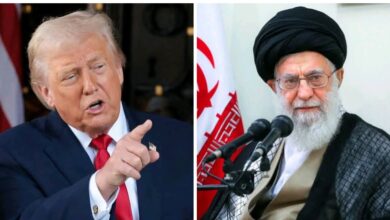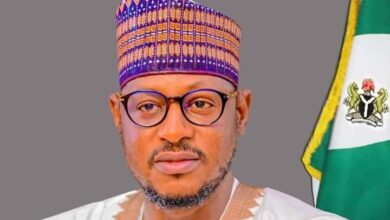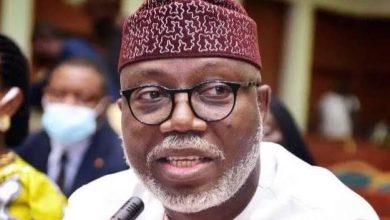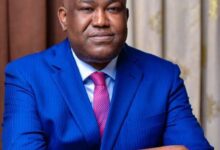Building our children for the future

By Muhammad Ajah
When I recently visited a private primary school, I attended a social studies class of children between the ages of five and seven. I was impressed by the high level of intelligence displayed by the children. They were very hopeful that their futures are bright. I could see it in the way they responded to questions. Every question received quite impressive answers. And for every question, all the children raised their hands, an indication that their teachers were up and doing. But I was dumbfounded by the reaction of these young sinless creatures towards governance.
I sat and listened as the teacher taught his subject and then threw a question to the floor after the lesson: “Ok, what do you want to be in future?” The children competed to be recognized and heard. “I want to be a pilot”, one said. “I want to be an engineer”, another replied. “I want to be a banker”, the third said. “I want to be a farmer”, the fourth proclaimed. The children went on one by one choosing different professions even as some of them contested for already mentioned ones including being doctor, nurse, teacher, business personality, captain, soldier, footballer and so on. I doubt if I heard anyone say police. I could not understand why. I paid keen attention to the mindboggling revelations from these future leaders almost with hidden tears.
The teacher asked them to clap for themselves and there was a thunderous sound as all were satisfied to have made the best choice for their future. Some of the more vibrant children made further explanations before or after making their choice profession. Some of them said it was their father who told them what they would be; some said it was their mothers; some said it was their uncles, aunties. However, few said that they were influenced by what they heard or watched on the television especially movies. It was quite clear that something had influenced a lot of choices.
But there was a surprise. A surprise, indeed! I was given the opportunity to address the children. I thanked them for such wonderful careers they have made for their futures. I praised the teacher for being wonderful in his profession, including the techniques he employed. Then, I told them that none made the choice of some critical professions in Nigeria. They were astonished and they looked at one another as if to disprove me. So, I threw the question to the floor: “Who wants to be a politician?”
There was complete silence initially. Most of them did not raise their hands apparently because they did not understand the work of a politician. It was clear that they knew the duties attached to the professions they had chosen. The four children who raised their fingers had different views on why they would be politicians. The first said: “I want to be a politician so that I can be very rich”. The second replied: “I want to be a politician so that I will own plenty houses and cars”. The third said: “I want to be a politician so that I will have power and body guards”. And the fourth, to the surprise of everybody in the class, replied: “Uncle, I don’t want to be a politician because they are thieves.” After some efforts to convince the child against such perception, he said that sometimes when they watched the TV at home, his father would shout: “These politicians have come again! They are thieves! They are liars! I don’t like these people.” The little boy said that some other times, the father would switch off the TV or walk away into his room.
Then I asked the second question: “Who wants to be the president of Nigeria?” All the children raised up their fingers except the same boy who abhors to be a politician. When asked why, he said “My parents told me that our presidents do not fulfill promises. They tell lies and steal the money of our country. But my parents and my teachers tell us to fulfill promises, to be truthful and sincere and not to steal. So, I will not disobey my parents”. The class teacher and I were speechless. The teacher smiled softly apparently proud of the child’s courage and intelligence.
Then I threw the third question: “Who wants to be a lawyer?” Though it was already chosen, I wanted to be sure of the number of children interested in the profession. Only very few raised up their fingers. I turned round and asked one of those who refused to raise her finger and she replied: “I heard that a lawyer tells lies because he can free a thief at the court. I also learnt that many of them collect bribe to do cases at the court. It is not a good conduct”. That was the perception of the little girl.
I want to relate this experience in a children’s class to the reality in our politics. When a child begins to suspect the misconduct of its parents, it is only a diehard inhuman parent that will resist to change his/her way. Every responsible parent wants the child to be good. Today, Nigerian children are feeling the heat in their country and therefore are asking their parents, uncles and aunties to retract their steps and march on the path that will guarantee their future.
Imagine what a little child perceives of a Nigerian politician! This is in a school of the privileged because I am pretty sure that the smartness I saw in the children could not be of the learners in our public schools. It is possible that some of the parents of those children were politicians. However, I did not ask the professions of their parents in order not to disabuse them before their highly positive-minded children.
Summarily from the retorts of the children, they hated politics because of corruption. It is as if corruption is an indispensable part of Nigerian politics, as if there is no saint amongst Nigerian politicians. By the way, the children may have been influenced. Yet, innocence perceives better than contaminated and overburdened brain. And if truth was to be, there is nothing less than the reality that politicians are the primary cause of Nigeria’s woes.
I picked special interest in the reaction of the parent who watched the television with his child. He shouted that the politicians are always bereft of the truth. They tell lies and make promises that are never fulfilled. I am sure that is the position of millions of Nigerian parents. That is the influence of parents over their children. But what positive effects have these influences had on the children who grow to replace their parents. If there had been good impacts of the parents on their children since, at least 1960 when Nigeria got her independence, things would have changed. This bad perception by the modern Nigerian would have not been.
From all the responses of the children, the three arms of government which have proven to be responsible for Nigeria’s underdevelopment are detested by the children. Some detest to be lawyers who constitute the Judiciary and the lawmaking organ of the government. Some hate to be president because of the unholy acts associated with the position in Nigeria. And all being politicians, they have put Nigeria in its present condition.
Our children must be taught well in public schools. Teachers in public schools must be cared for. I hope one day to visit a selected public school and relate my experiences with the children. Parents must inspire their children to aim high in life but practically display this by the way they chase legitimate livelihood. Children are very quick to learn. They copy everything within their reach. They are true reflections of their parents. In the simplest term, they are “carbon copies” of their parents or homes. Parents are the best models for them. It is said that charity begins at home. If parents and teachers can properly guide and build the children with the intention of building a good future society, Nigeria will be good in a not-distant time. That is our wish for our country.
*Muhammad Ajah is an advocate of humanity, peace and good governance in Abuja. E-mail mobahawwah@yahoo.co.uk.









